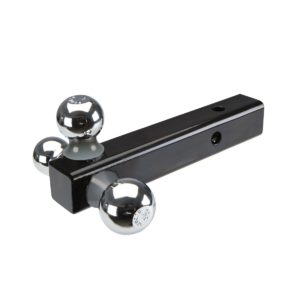Trailer Towing Basics

Trailer Hitch
It seems like an easy job, just hitch up and hit the road, right? Not exactly. Trailer towing may be more difficult than you previously thought. It’s important that you know the trailer towing basics otherwise you may end up causing a road accident and hurt both yourself and other drivers.
When towing a trailer your vehicle becomes heavier and it’s not so easy to stop when you want to. Other drivers may not be as friendly and some may not let you change the line. This all seems like a stressful experience, but with the right tips and tricks up your sleeve towing a trailer can be as smooth as a regular drive.
Here’s what you need to know:
Shopping for the right hitch
Shopping for the right hitch type can be frustrating and confusing because there are so many different types to choose from. But hitches are generally divided into 4 classes which differ by a maximum GTW (Gross Trailer Weight) limit and a maximum TW (Tongue Weight) limit.
Depending on your vehicle type and on your trailer, you can shop for a Class 1 hitch which is intended for 100 lbs TW and 1,000 lbs GTW if your vehicle is smaller and lighter. If you’re not sure which one you need or you’ve never done it before, make sure to consult your vehicle owner’s manual for information on towing a trailer as well as your vehicle’s weight capacity limits. If you can’t find that information on your own, find an expert to do that for you.
Weight restrictions depending on the hitch class are the following:
Hitch classes:
Class 1
MAX TW: 200 lbs, MAX GTW: 2,000 lbs
Class 2
MAX TW: 300 lbs, MAX GTW: 3,500 lbs.
Class 3
MAX TW: 500 lbs, MAX GTW: 5,000 lbs.
Class 4
MAX TW: 1,000 lbs, MAX GTW: 10,000 lbs.
Hitch Types
There are different trailer hitch systems depending on what you need done. The type you need to choose is determined by your vehicle make and model. In the trailer towing, there are basically three types of hitches you can choose from:
Weight-carrying hitches, also called fixed-tongue hitches which are designed to carry all the trailer’s tongue weight, as the name itself indicates. Remember: these are designed to carry lighter loads.
Then you have receiver hitches, also known as load-equalizer hitches. These hitches are meant for bigger loads and they distribute the tongue weight evenly in order to maintain the balance. These hitches are usually used on larger vehicles like SUVs and can be used for two to even four-horse trailers.
Last but not the least, 5th wheel hitches are used for heavy-duty towing.
In order to tow safely and legally, you may need different equipment depending on your vehicle type and capabilities. It all depends whether your vehicle is a heavy-duty pickup or an SUV or simply a passenger car. Each vehicle is unique and you may need to install a number of upgrades before you can tow safely.

I did not know that there were so many different kinds of hitch types for your trailer. Weight-carrying hitches sounds really nice. I like the fact that they are designed to carry all the trailer’s tongue weight. We have a lighter boat, so this kind is probably the type of hitch we will get!